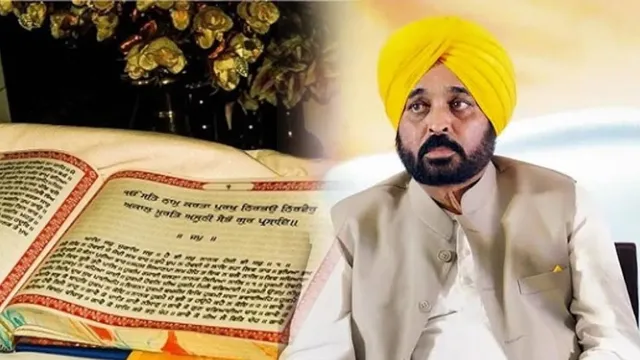- By Akansha Pandey
- Tue, 15 Jul 2025 07:32 PM (IST)
- Source:JND
Punjab Anti-Sacrilege Bill: Bhagwant Mann-led AAP government in Punjab has introduced the "Punjab Prevention of Offences against Holy Scriptures Bill 2025" in the Legislative Assembly. The bill proposes punishment up to life imprisonment for desecrating holy scripture, including the Guru Granth Sahib, Bhagavad Gita, Bible and Quran. The anti-sacrilege bill has now been sent to the select committee of the Punjab Assembly for it to seek public opinion on the proposed legislation. Speaker Kultar Singh Sandhwan said the panel will submit its report on the bill within six months.
"Two historic bills were passed unanimously in the Punjab Assembly today. A bill has been passed to ensure strict punishment for those involved in desecration of religious texts and a provision has been added to ensure strict punishment in cases of involvement in drugs... These decisions have been taken in the best interest of the people of Punjab," Chief Minister Bhagwant Mann said.
#WATCH | Chandigarh | Punjab CM Bhagwant Mann says, "Two historic bills were passed unanimously in the Punjab Assembly today. A bill has been passed to ensure strict punishment for those involved in desecration of religious texts and a provision has been added to ensure strict… pic.twitter.com/D7H87ttMgP
— ANI (@ANI) July 15, 2025
This is the third time the Punjab Assembly has attempted to enact a bill for stringent punishment in cases of sacrilege. Earlier, bills passed by the Akali-BJP government in 2016 and the Congress government in 2018 were returned by the President without assent.
What Is 'Sacrilege'?
The term 'Sacrilege' has been broadly defined in the bill. It includes any act with the intention of deliberately insulting a religion, including physical acts such as damaging, burning or tearing sacred scriptures. The definition goes beyond physical damage and criminalises any deliberate act that disrespects the sanctity of a sacred scripture. While supporters say it is necessary to preserve religious sentiments, critics say such a broad definition can be misused.
What Is The Anti-Sacrilege Bill?
The Punjab Cabinet has given its approval to the draft of India's first comprehensive anti-sacrilege law. According to this bill, offence means any sacrilege, damage, destruction, defacing, disfiguring, de-colouring, de-filling, decomposing, burning, breaking or tearing of any holy scripture or part thereof, including Guru Granth Sahib, Bhagavad Gita, Bible and Quran.
Under the new bill, which was passed by the Punjab cabinet, any person found guilty of sacrilege may face imprisonment ranging from 10 years to life. The guilty shall also be liable to pay a fine of Rs 5 lakh, which may extend up to Rs 10 lakh. Once enacted, offences punishable under the bill shall be cognizable, non-bailable and non-compoundable and will be tried by a session court. The probe shall be conducted by a DSP-rank police officer.
The new law has been introduced a decade after the incidents of sacrilege of scriptures at Burj Jawahar Singh Wala and Bargari in Faridkot district. This is the third such law after the Behbal Kalan sacrilege and police firing incidents in 2015.
Why Punjab Govt Brought the Anti-Sacrilege Bill?
Sacrilege has been an emotive issue in Punjab, and there have been demands from various quarters for stringent punishment for sacrilege. Since 2015, Punjab has witnessed several major incidents of sacrilege, including the desecration of the Guru Granth Sahib in Bargari and police firing on protesters in Behbal Kalan, which led to massive public outrage and demands for strict laws. This proposed legislation aims to fill that legal void by criminalising and prescribing punishments for acts of sacrilege across all sects and faiths.
Earlier governments have also attempted to enact such laws. The Akali Dal-BJP coalition in 2016 proposed bills to amend the Indian Penal Code (IPC) and the Code of Criminal Procedure (CrPC). These bills recommended life imprisonment for insulting the Guru Granth Sahib. However, the central government did not approve the bills, saying that all religions should be treated equally under the secular spirit of the Indian Constitution.
In 2018, the Congress government led by Captain Amarinder Singh passed two amendment bills 'Indian Penal Code (Punjab Amendment) Bill 2018' and 'Code of Criminal Procedure (Punjab Amendment) Bill 2018' that proposed life imprisonment for damaging or desecrating holy scriptures like the Guru Granth Sahib, Bhagavad Gita, Quran and Bible. However, neither bill received the President's assent.

